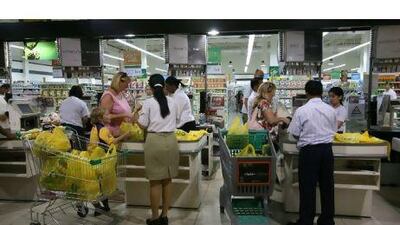By spring, all plastic bags that claim to be degradable must bear a logo showing that they meet government standards, a measure that takes the nation one step closer to a planned total ban on conventional bags by 2013.
The rule is part of a broader set of regulations developed last year by the Emirates Authority for Standardization and Metrology (Esma), which is now in the process of enforcing them.
"We will have the logo finalised within a month," said Mohamed Badri, the acting director general of Esma. Only companies that have been registered by Esma will be allowed to use the logo, which would be the only legitimate method of claiming bags were degradable, Mr Badri said.
Once the logo has been finalised and the stamping begins, this spring, an inspection process will ensure there are no impostors.
Plastic contributes to littering and pollution, and many of the bags end up in seas, oceans and other bodies of water, where they leach toxic chemicals into the environment. They also drift into open spaces, such as the desert, and can kill camels and other animals that ingest them. Much of the plastic we throw away also ends up in landfills, and it takes hundreds of years to break down.
To overcome the longevity issue, chemical companies have created additives that make plastic bags break down more rapidly. Known as oxo-degradable plastic, the material decomposes in the presence of light and oxygen.
Esma has approved the additives supplied by three international companies - D2W, Ener Plastics and Willow Ridge Plastics - all of which have a local presence. The agency is now seeking to license plastic bag manufacturers. Out of more than 100 on the market, only 13 had applied for certificates, said Mr Badri.
Bag manufacturers will have to declare the chemical composition of the additives they use, which are usually organic compounds of metals such as iron, nickel, cobalt and manganese. In addition to proving thay they are using approved additives, the premises of each manufacturer will have to be audited; Esma officials will assess the quality of the plastic material used and the production lines. Conventional plastic bags will be banned by January 1, 2013, a deadline set by the Ministry of Environment and Water.
"Practically, manufacturers have until the end of 2012 to comply, but they cannot call their bags degradable unless approved by us," Mr Badri said.
The plastics industry has presented oxo-degradable plastics as a solution to the problems associated with plastic bags, saying that even when discarded improperly the bags will degrade to carbon dioxide and water in the presence of sunlight. However, critics question the claim.
Last year, a study commissioned by the UK's Department for Environment, Food and Rural Affairs concluded that oxo-degradable bags were no better for the environment than conventional plastic bags. Carried out by a team of scientists from Loughborough University, the study found that additives did cause the plastic to break down into small pieces. Whether they further degraded, and how quickly, was up for debate.
Winston Pryce, the general manager of the Sharjah-based D2W distributor Eco-Polymers, said he disagreed with the findings of the UK study.
"We have got reports from independent labs that prove biodegradation," he said.
He explained that the basic material used to make conventional plastic was combined with different stabilisers and that anti-oxidants were added to slow the process so the plastic bags lasted long enough to be used by consumers.
"The basic material is naturally degradable," he said. "Our product is only acting as a catalyst."
Habiba al Marashi, the founder and chairperson of the Emirates Environmental Group, said there was not "one solution that fits all" when it came to plastic. Reusable bags, degradable plastic and efforts to recycle will all prove useful in reducing pollution.
"There will be a basket of solutions," she said. "As long as it does not end up in landfill."
Regarding the debate on oxo-degradable bags, Mrs al Marashi said: "Science is evolving all the time and what is best today may not be so in the next few years. It is a good first step."

